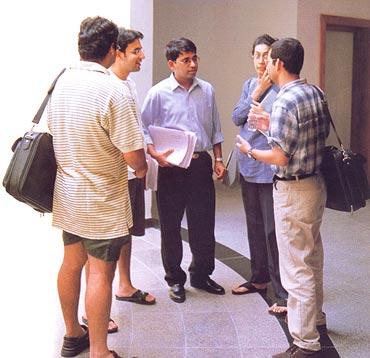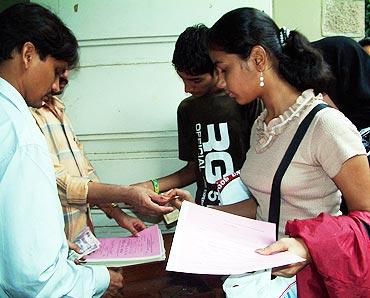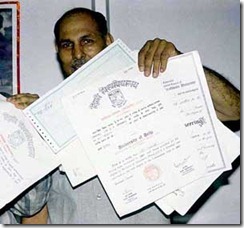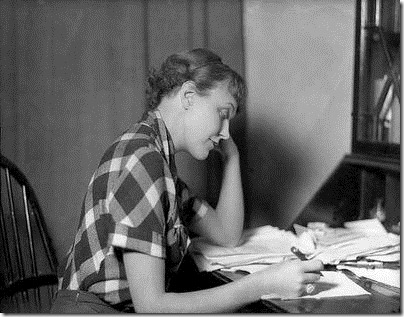
Rashmi Bansal, the author of the bestsellers Stay Hungry Stay Foolish and Connect the Dots, writes on youth, careers and entrepreneurship. Her new book I Have a Dream on social entrepreneurs has just been released. She writes this special column for Rediff.com
Climb every mountain
"Just a week back, I was holding on to a near-vertical ice face with a pick, weighed down by 25 kilos of supplies, with two other guys tied to me with a rope, completely dependent on me. And I think that was easier."
Easier than getting admission to Delhi University.
That statement by Arjun Vajpeyi, the youngest Indian to climb Mount Everest, is echoed by thousands of students vying for a few hundred seats in the 'most wanted' colleges of our capital city.
The DU mountain has always been a difficult climb, But this year it has gained Everest-like proportions, with the prestigious Shriram College of Commerce (SRCC) declaring a cut-off of 100 per cent.
Making the prospect of securing a seat icy and bleak, even for 'toppers'.
The trouble is there aren't too many other mountains to set one's sights on.
Unlike the mighty Himalayas, the college landscape in India consists of a few majestic summits and a large number of minor elevations. The climate on these academic molehills is neither pleasant nor invigorating.
It's like being in Lonavla during the height of summer when your friends are holidaying in Europe.
The cold hard fact is that the list of 'top colleges' in Delhi -- and most other cities across India -- remains practically unchanged in the last fifty years. The colleges students vie for were established during the British era, or shortly after Independence.
This is not at all surprising, because a good college builds its reputation slowly.
It can easily take fifty, or even a hundred years. That is why commercially driven colleges cannot and do not prosper easily. The businessman looks for short-term gain, breakeven point and bottom line.
For that reason alone, new colleges are not coming up in the traditional areas of Arts, Science and Commerce.
Returns from engineering and management are far more attractive.
Even the government is focused on 'professional' education, and more so on existing brands like IITs and IIMs.
That leaves the 'degree' college market stThe agnant and under-capacity. God help the 'average' guy when the 98% er is anxious and unsure, about his kismat...
Making the best of it

Some are calling this the 'Rajnikant' effect in admissions but sadly this is only a cruel joke.
All your dreams are shattered, your spirits low. You resign yourself to joining some 'shady' college. Right now, quite honestly, it feels like the end of the civilised world.
I know because that's how I felt in July 1988. After a year in the US, where my father was working with NASA, I came back to India and wanted to join St Xavier's college, Mumbai.
They said, "Sorry, you've come late. Admissions are closed..."
"There are other good colleges," said my mom, and off we went prospecting.
The gloomy corridors of Elphinstone college depressed me; Jai Hind looked like a place where 'what you wear' mattered too much. Sydenham offered only commerce. Where else could one go!
Try Sophia College, someone suggested. I wasn't keen, but what choice did I have? We made the trip, from Navy Nagar to Peddar Road. And guess what, the moment I walked into that cool marble corridor, I felt a sense of peace. The sun came out from the clouds.
We met the Vice Principal, a kindly lady whose sari pallu never quite learnt to stay in place. She did not labour too long over my odd foreign marksheet. Or scold me for applying late.
"Okay, you are admitted. Welcome to Sophia!"
And there I was. Not getting into Xavier's -- in hindsight -- was the best thing that could have happened to me. I was jolted out of my sheltered existence.
Those three years at Sophia changed me, in ways I could not have imagined. I learnt to travel, make new friends and take up positions of leadership.
The less-than-perfect college I was forced to join gave me a far bigger canvas - to discover myself and what I was capable of.
But it did not happen on day one...
The Lotus Effect

I am back in school!" I thought to myself.
Sophia College didn't have a uniform but the way the girls spoke, the way the professors taught -- it didn't feel like college. No one asked questions; everyone just took notes.
The large majority of girls were from conservative families -- both Hindu and Muslim.
Some of the Muslims came to college in burqa -- for their convenience there was even a stand where they could hang the burqas during college hours.
After spending a year in an American high school, all this was a cultural shock. To think I had once dreamt of attending an Ivy League college, and now I was stuck in a convent, administered by nuns.
Well, soon enough I discovered there was a silver lining at Sophia. It had plenty of extra-curriculars in the form of clubs.
Immediately I set about joining as many as I could - International Relations Club, Film Club, Bhartiya Sanskriti Parishad.
My personal favourite was SPRAG -- the Sophia Press and Radio Action Group.
The second thing I quickly realised is most of the clubs were dead. 90 per cent of the girls had no interest in extra-curriculars and didn't want to stay back till 2 pm (when college officially ended and club activities began).
So if you came forward, you quickly got to do things. To become one of the core group, to do what your heart desired.
Over the course of three years I represented my college in dozens of inter-quiz competitions. Even at outstation fests like Oasis (BITS Pilani) and Mardi Gras (IIT Madras).
My big challenge -- every year -- was finding one more girl interested in quizzing. Since most competitions require a partner!
In my third year, I became editor of the college magazine. And secretary of SPRAG (the media club).
Every month I produced an 8-sheet Xerox offset newsletter called 'Snippet' which was sold for Rs 2 per copy.
The issue which carried a debate on whether Sophia should remain a 'girls-only' college created a bit of a stir.
As did my idea of a 'black band' day to protest against the Mandal Commission.
The Principal -- crusty old Sr L Rodrigues -- said to me in so many words, "If you want to do this kind of thing, find some other college."
Point taken and protest halted... There is a limit to 'democracy' inside a college with pink walls!
Lemon vs Lemonade

At Sophia -- because of the combination of subjects offered I had to take English Literature along with Economics and Statistics.
I enjoyed it so much that at the end of the second year I almost changed my major. Although in the end I stuck with Economics, I know those two years of Keats and Yeats were a wonderful exposure. That shaped my thinking and writing in years to come.
To sum up, when life gives you a lemon, you gotta learn to make lemonade.
What's more, something that appears to be a lemon from afar may actually be a semi-sweet orange, when you take a closer look.
A college where 'things don't happen' is a place waiting for someone to come along and 'make things happen'.
Revive existing activities, or start new ones. Set up a chapter of NEN (National Entrepreneurship Network) or Rotaract; become part of a larger movement.
In every college where 'teachers don't take interest' there is at least one teacher, waiting for an interested student. Be that student. Take whatever subject you are studying seriously, go deep into it like a diver looking for that elusive pearl.
College is like a mental gym. The subjects you study are like equipment. You might prefer treadmill but only get a chance to use barbells -- either way you will see the benefit.
English literature or economics -- neither is going to be of 'use' in practical life. But if you study a subject with passion and understanding, you will develop a critical faculty.
The ability to think, to look at a situation from all angles, to assimilate ideas. And come up with your own.
The Last Word

If you still need convincing, do pick up a book called Adapt by Tim Harford (of The Undercover Economist fame).
It's a dazzling and convincing argument on why success always starts with failure.
Harford believes that 'trial and error' is the most effective way to solve problems. And that flexibility and experimentation are the qualities you will need the most in an increasingly complex world.
Be that person who tries harder, and is never afraid to make a mistake. Treat your life like one grand experiment. For, results come in the most unexpected ways.
Alexander Fleming discovered penicillin because he never kept his laboratory clean. Who knows what you might discover, in the contaminated petri dish of life.
If you believe in yourself, 100%.
Rashmi Bansal, the author of the bestsellers Stay Hungry Stay Foolish and Connect the Dots, writes on youth, careers and entrepreneurship. Her new book I Have a Dream on social entrepreneurs has just been released. You can reach her at mail@rashmibansal.in








 MSW Students with the dignitaries on the first day
MSW Students with the dignitaries on the first day  Thiruvanthapuram, Aug 11 : The Asian School of Business (ASB), a leading B-school in India, is proactively encouraging admission of North East students with rural background for its flagship post-graduate programme. Accordingly, in collaboration with the charitable George M Thomas Foundation, ASB will be offering scholarships of up to 50 per cent on the full-term fee for one student from each of the Seven Sisters.
Thiruvanthapuram, Aug 11 : The Asian School of Business (ASB), a leading B-school in India, is proactively encouraging admission of North East students with rural background for its flagship post-graduate programme. Accordingly, in collaboration with the charitable George M Thomas Foundation, ASB will be offering scholarships of up to 50 per cent on the full-term fee for one student from each of the Seven Sisters.























